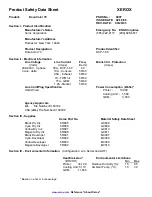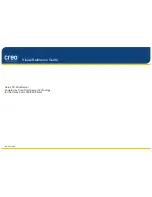
User's Guide
- 32 -
For Macintosh users
1.
Allow the network DHCP server to assign an IP address to the printer.
2.
Obtain the printer IP address either:
- From the printer control panel
- From the TCP/IP section in the Network/Ports menu
- By printing a network setup page or menu settings page, and then finding the TCP/IP section
Note:
You will need the IP address if you are configuring access for computers on a different
subnet than the printer.
3.
Install the printer driver on the computer.
a.
Insert the
Printer Driver and Documentations
CD in the CD drive of your Macintosh.
b.
Double-click the CD icon on the desktop, the Drivers folder, and the Mac folder.
- Mac OS X v10.3/v10.4: double-click LP4700-1Series_103104.pkg
- Mac OS X v10.5: in the english (other) folder, double-click LP4700-1Series_105.pkg
- Mac OS X v10.6/v10.7/v10.8: in the english (other) folder, double-click LP4700-
1Series_106.pkg
c.
The installer for the printer driver starts up.
Note:
For OS X 10.6/10.7/10.8, the driver folder varies depending on the paper size.
Select the appropriate driver folder for your environment.
•
To use inch-based paper size (8 1/2 x 11 in letter size): Select a file in the english folder.
•
To use metric-based paper size (A4 and the like): Select a file in the other folder.
Note:
Double-click the package file appropriate for the application and version of operating system being
used.
•
LP4700-1Series_103104.pkg (for Mac OS X v10.3/v10.4)
•
LP4700-1Series_105.pkg (for Mac OS X v10.5)
•
LP4700-1Series_106.pkg (for Mac OS X v10.6/v10.7/v10.8)
4.
Add the printer.
a.
(For Mac OS X v10.3/v10.4/v10.5/v10.6)
Apple menu >
System preferences
>
Print & Fax
>
+
(For Mac OS X v10.7/v10.8)
Apple menu >
System preferences
>
Print & Scan
>
+
b.
Select your printer.
c.
Click
Add
.
















































